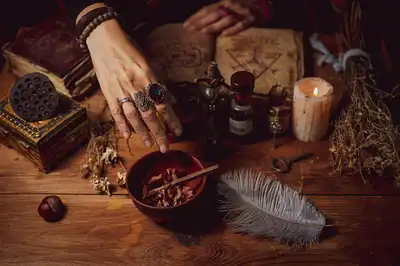Is Witchcraft Real in South Africa?

Nearly everywhere in the world, there has been a widespread practice of witchcraft. Maleficium (wrongdoing) in Latin America, magic in Europe, and superpower in Asia are the names given to it. In Africa, persons suspected of witchcraft frequently suffer death. Various charges, including producing impotence, sour milk, disease, and death, are brought against witches.
Some regions of the world do not necessarily see witchcraft and witches negatively. “Toyo no Majo” or “Oriental Witches” is the nickname given to the Japanese women’s national volleyball team, which captured the gold medal at the Tokyo Olympics. 1 Real witchcraft offers a secret knowledge that some people utilize to their own advantage and is an area of exploration and adventure into fantastical worlds.
Do they exist in South Africa
In South Africa, there has long been a widespread belief in witchcraft, and the penalties are severe. Anyone in a position of power or authority has that power because their witchcraft or magic is more advanced than their rivals’.
Defining Witchcraft
We divided the complex subject of witchcraft1 into three categories to make it easier to understand. The first sort of witchcraft relates to some people’s ability to control natural objects as well as spells, charms, and incantations that cause damage to others According to Larner (1974), this type of witchcraft is released by the use of hatred-activated power. Thus, interpersonal conflicts, envy of others’ achievement, and even attractiveness, may serve as inspirations for harming another person (Evans-Pritchard, 1937; Fortes, 1953).
The second kind of witchcraft is deeply rooted in religious tradition and involves making a bargain with Satan, a fallen angel who is connected with evil in Christianity. Here, it is thought that witches, who practice witchcraft, have sex with the Devil in exchange for supernatural abilities that they can use to destroy their foes (Heinemann, 2000; Parrinder, 1963).
The third kind of witchcraft, which is quite similar to the first, is indicative of an evil society. Witches in this community cooperate with one another to harm rivals and even work together to harm others (Levack, 1995).
- What Are FICA Documents in South Africa?
- What Age Can You Get a Tattoo in South Africa?
- Is Nandos Halal in South Africa?
- Were Slaves in South Africa?
- Is Yohimbe Legal in South Africa?
Violence Against Suspected Witches in the Post-Apartheid Era
Ntombikayise Zulu, 72, was taken to tribal court one evening in the South African town of Mondlo during the late spring of 2008. After they had killed her “familiar,” a squirrel that hunted chickens, the neighbors believed she meant to kill them. Zulu, who sadly asserted that she had never engaged in witchcraft, fit the South African idea of a witch because, after all, she was an elderly black woman.
I contend that the age of witch-hunters is more closely related to economic and social factors than generational ones, notwithstanding what some academics have claimed about these renegade adolescents.more than anything else, standing. These men may believe that by giving their communities the security that their dads couldn’t, they are making up for something. Older black women are nearly often the targets of contemporary witchcraft charges, as the cases of Zulu, Zungu, and Thusi indicate.
Share This





